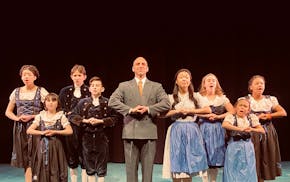For the first couple of chapters I, jaded reader that I am, thought wearily, I've read this novel many times before: confused relationships, dysfunctional marriages among affluent urban professionals. But gradually Tova Mirvis won me over with her empathy with her characters, whose inner lives she probes with subtle insight and style in "Visible City" (Houghton Mifflin Harcourt, 256 pages, $24).
Thirty-something Nina, a restless and lonely stay-at-home mother of two young children, turns out her lights at night to watch her neighbors, a middle-aged couple, as they and their daughter appear and disappear behind their uncurtained window. They do little more than sit reading on their sofa, but Nina imagines their lives as contented and solid, as opposed to her dissatisfaction with her own marriage. Her husband, Jeremy, a real estate associate at a large firm, works late every night, so after the children are put to bed, she has nothing to do.
Walking with her children one day, she runs into one of those neighbors, Leon, a therapist, and they begin an acquaintance that will turn into a dangerous friendship for both of them. Meanwhile, Jeremy, both overworked and increasingly bored by his job, starts playing hooky. He falls in with a mysterious man who calls himself Magellan and who has taken on a mission to explore the abandoned subways and other unknown or forgotten parts of the invisible underground of New York City. "Magellan told Jeremy that if you were going to really live in this city, you needed to see down to the infrastructure, the steel frames, the bare bones."
In the library one day, looking up the history of those closed subways, he meets Claudia, Leon's wife, a historian of stained-glass windows who is on a quest to find a lost piece by 19th-century artist John La Farge. Jeremy takes an interest, wondering if perhaps the lost window is hidden in a Cornelius Vanderbilt property that his developer client plans to tear down. It was frustrating to me that Mirvis doesn't pursue this subplot.
This is a profoundly sad book, about three couples who have lost their way in life or begun to realize they never found the right way to begin with. As Leon wryly tells Nina, who gave up her legal career to raise children, "Welcome to adulthood. What you thought it was going to be like has nothing to do with anything."
What these characters have in common is their inability to really see each other. They flounder because they can't get down to the bare bones of their relationships or even their own needs and desires. It's a familiar story, but achingly well told. The novelist wisely offers no solutions. We readers are left with no clues about how these lives will proceed.
Brigitte Frase is a book critic in Minneapolis.

A former deli maestro steps into Capt. von Trapp's shoes in Artistry's 'Sound of Music'

NPG vets Michael Bland and Sonny Thompson extend their brotherhood into a post-Prince duo
